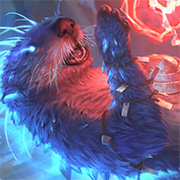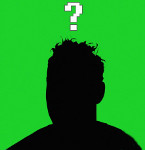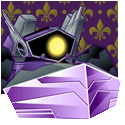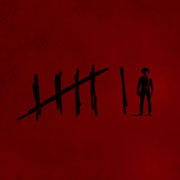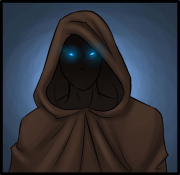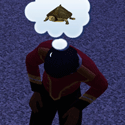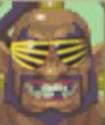|
thelazyblank posted:Firefly or Serenity? Not that the former was some amazing example design, but I don't know if I'd call it by the numbers. It was one of the better books at explaining how Cortex Plus should work at least. Serenity was a tirefire, and was downgraded to technically playable once they released the second book. I like the Cortex System a lot better than Cortex Plus actually, and had a lot of fun GMing a couple of Serenity campaigns. The 'G' in my avatar was given to me by somebody who thinks 'Grognard' is an insult.
|
|
|
|

|
| # ? Apr 25, 2024 20:10 |
|
MollyMetroid posted:Vader's stupid pun joke reminded me of the Vader from the Star Wars Radio Drama, who has to narrate his poo poo because you can't see what's going on. Radio Vader is hilarious. I need to check that out some time. The thing is, Vader does make a lot of dry one-liners. The problem with the joke in Rogue One is that Vader's standard is telling the joke so dry that the immediate response is to just take him at face value, like he doesn't even understand how anyone could find it funny. It's a Leslie Nielsen joke if Leslie Nielsen was holding a gun to your head. The Kieron Gillen Darth Vader comic does it pretty well. Lines like "Very well. Lower your weapons. You will not be harmed." flow like standard dialog, even if they're punchlines. The bit about not choking on your ambitions is a joke delivered like a joke. And that doesn't fit.
|
|
|
|
SirPhoebos posted:The Genesis device was developed independent of Starfleet. Carol Marcus runs Regula One on her own, and has to basically send a grant video to the Federation, which is how the Reliant becomes involved in finding a test planet. Right from the beginning Carol and Starfleet are aware that the device could be weaponized by using it on an inhabited planet. The Devise itself works as the plot requires. It's in III that we find out that the Genesis device is flawed because David used proto-matter in the matrix, which 1) sets up a cool finale of Kirk and Kruug fighting over a volcano and 2) explain how Spock's body regenerates and goes through being a couple of child and young actors before becoming Nemoy again. Right, that's even better. I guess working with mad scientists is okay as long as nobody lives on the test planet. Kurieg posted:I still have a soft spot for Voyager since it was one of the few shows that both my dad and I enjoyed and would watch together every week. I agree that the first few seasons are bad on the whole but it's better once they get rid of the plot tumor that is the Nelix/Kes/Paris love triangle and let Picardo actually loving act. Picardo deserved a better show. He's one of the very few highlights in Voyager.
|
|
|
|
Doresh posted:Picardo deserved a better show. He's one of the very few highlights in Voyager. The show is also weirdly experimental even while treading old ground. Bride of Chaotica and <Horrible Fake Irish Town Episode> are both about the holodeck going wrong. But one of them actually acknowledges and revels in the insanity of it's own premise and is good, and the other has Janeway getting mad because someone's going to reprogram her sex toy boyfriend and is excruciating to watch.
|
|
|
|
Oh man, hearing about the Polaris timeline is giving me loving Kromore flashbacks.
|
|
|
|
Humbug Scoolbus posted:I like the Cortex System a lot better than Cortex Plus actually, and had a lot of fun GMing a couple of Serenity campaigns. The 'G' in my avatar was given to me by somebody who thinks 'Grognard' is an insult. Did you use the Big drat Heroes book? I remember it helped a bit in terms of mechanics, but I can't remember what it actually added. It definitely didn't have mechanics that felt like the TV show. This does remind me as part of my unwritten resolution to actually look at some old mechanics and see if they hold up better or worse after recently playing some Spycraft 2.0. Mainly, not trying to use everything all the time or calculating everything unless it might actually matter. That being said, I doubt it's going to move the meter much. The Cortex Plus version in play is what I want from Space Westerns.
|
|
|
|
Kurieg posted:The show is also weirdly experimental even while treading old ground. Bride of Chaotica and <Horrible Fake Irish Town Episode> are both about the holodeck going wrong. But one of them actually acknowledges and revels in the insanity of it's own premise and is good, and the other has Janeway getting mad because someone's going to reprogram her sex toy boyfriend and is excruciating to watch. Janeway's mismanagement as a character was a huge problem for Voyager. The male writers had no idea how to handle a female captain and usually defaulted to "Nobody ever questions her ever she is always right and the universe bends to make it so!" while Jeri Taylor, the lone woman on the regular writing team, treated her as a Mary Sue and I think was responsible for the most painful holodeck shenanigans, plus whatever the gently caress 11:59 was.
|
|
|
|
I forget the exact details, but there was a big push from Paramount late into TNG's life to try and bring in a women audience and for whatever reason this basically resulted in a small assortment of excruciating soap opera style romance episodes, because the TV industry is a cesspit. I wouldn't be surprised Voyager got hit by the same sort of direction, and I think DS9 partly did so well because it was the "secondary" series so they had a lot more leeway to avoid weird mandates from the producers. Also this makes me want to pull out the old Last Unicorn TNG RPG and review it, except I won't because it's staggeringly boring and with horrible clunky rules and I can't be assed to spend effort on it. Which I guess is a review? There you go.
|
|
|
|
Kavak posted:Janeway's mismanagement as a character was a huge problem for Voyager. The male writers had no idea how to handle a female captain and usually defaulted to "Nobody ever questions her ever she is always right and the universe bends to make it so!" while Jeri Taylor, the lone woman on the regular writing team, treated her as a Mary Sue and I think was responsible for the most painful holodeck shenanigans, plus whatever the gently caress 11:59 was. Seven was also a good character, but she was sleeping with one of the lead writers so she got used far, far too much. Tuvok was also great, a Vulcan who always has balls-out rage lurking under the surface rather than Spock's sadness. And he strangles Neelix to death. Sadly, he does so on the holodeck.
|
|
|
|
PurpleXVI posted:Oh man, hearing about the Polaris timeline is giving me loving Kromore flashbacks. A good rule of thumb is that you only really need one apocalypse. Going for repeats just means you didn't get it right the first time.
|
|
|
|
chiasaur11 posted:A good rule of thumb is that you only really need one apocalypse. Another thing is that it tends to work out when some antagonist faction discovers supertech or gets wizard whales or whatever and imposes its will on the world, because that gives the PC's something to fight against, a bad status quo to upset. But giving wizard whales and superpower and a magical undersea unassailable fortress to a bunch of hippie nerds that sound suspiciously like they're the author's DMPC's or otherwise favoured "protagonist" faction, that just rubs me the wrong way. There's just something super wanky and elminstery about it.
|
|
|
|
Asimo posted:I forget the exact details, but there was a big push from Paramount late into TNG's life to try and bring in a women audience and for whatever reason this basically resulted in a small assortment of excruciating soap opera style romance episodes, because the TV industry is a cesspit. I wouldn't be surprised Voyager got hit by the same sort of direction, and I think DS9 partly did so well because it was the "secondary" series so they had a lot more leeway to avoid weird mandates from the producers. The LUG stuff -did- give us notes on Andorian culture that included "That one time all the Andorian teenagers fell in love with Vulcans and Vulcan culture and started writing literature and doing plays about them, including a musical called "IT IS LOGICAL TO SING" so they're not all bad. (S. John Ross wrote that bit, IIRC, no one is surprised.)
|
|
|
|
Vampire: the Requiem, 2nd Edition Next up is the ST section, which is quite lengthy and has a lot of detailed advice for how to bring out the drama and pathos of Vampire if that's what you want to do, how to make feeding encounters seem more personal and so on. It's pretty good advice, on the whole. And we're wholesale skipping it because you can buy the book if you want to run Vampire. Thus, we're heading into the appendix on the living. It discusses handling humans and human PC even in Vampire games, from the dangers if the Masquerade is breached, whether to your neighbor or to Majestic 12, to blood dolls - the people who are in the know and get off on being bitten. They exist. In fact, some of them become political players because they collect information. Then you have the mortals who are being groomed to become vampires, or the ones you fall in love with against all odds, or your mortal family. All of these get story hooks and ideas. But most of hte text is on ghouls. Ghouls are empowered and addicted. No one knows when the first ghoul was made, and no one cares. Being a ghoul is about being alive, in the now, and making your now last forever. It feels incredible. It's like being a vampire, but better. You get the youth, the powers, the knowledge, the parties. The price? Just doing some favors for your fixer...and keeping on your doses. See, you miss one and the entire Vitae train derails. The withdrawal is worse than anything you've ever had - and you're stuck being a normal person again. See, ghouls are more than just mortals with a Vitae addiction. They have a little vampiric will within them. They are at once the most trustworthy and most treacherous servants of a vampire - they're blood bonded and potent, sure, but the blood bond is not an infallible keeper of loyalty. It doesn't compel action - it just compels emotion. And a ghoul that needs a fix...well, they'll give anything up for it. Anything. Many vampires end up making ghouls because, subconsciously, they need the company. It gives them a reason to stay up, a reason to care. Even vampires need company. And the feeling of being a ghoul is intensely pleasant. It makes you feel more living than living. The ability to make ghouls is, essentially, an extension of the corruptive and infectious nature of vampirism. They are infected with the Vitae and gain some measure of the power. There's many reasons that vampires choose to make ghouls, even ignoring their unconscious desire for company. Sometimes, a vampire wants tools to influence the living world with. Sometimes, a vampire wants to empower their old friends, or to have a way to better control a minion. Sometimes a minion begins to grow old and a vampire wants to keep them around, perhaps for their knowledge, skills or connections. And other times, it's because the vampire cannot bear to lose the ghoul. My favorite example here is a French vampire who has ghouled the last living castrato. He believes that what was done to the man was heinous, but the voice is too beautiful to lose, and the two of them agree that the man must be made immortal...but worry that a full Embrace might change his voice when the fangs come in. Sometimes, a family is made ghouls as part of their ongoing existence. These ghoul dynasties tend to serve similar kindred dynasties, but not always. Sometimes they are a specialized group that is good at finding vampires and offering their specialized services in exchange for blood. A ghoul is made when a vampire feeds a mortal at least one Vitae and invests it with a point of Willpower, both of which are given to the ghoul to use as their own. It's an energizing, invigorating feeling. A ghoul also gets two dots of their regnant's clan Disciplines...though there's a few restrictions which we'll get to in a moment. Ghouls are considered to have Blood Potency 0, which can never be raised. They don't age, so long as they remain a ghoul, and may tap into Physical Intensity and healing as if they were vampires. They also remain conscious even when full of bashing damage, like vampires. They lack vampiric senses but can still try to track people by the taste of their blood. Ghouls can learn any vampiric Disciplines as vampires do, but may not learn blood sorcery or the Coils and Scales of the Dragon. Whenever a Discipline would be contested or resisted by a vampire, they don't get to add their Discipline dots to the roll, and automatically fail if they have any stage of blood bond towards the vampire they're targeting. Further, any Discipline requiring the user to spill blood or feed it to someone is impossible for a ghoul to actually use, though they can learn it on the way up a discipline. Ghouls automatically expend one Vitae each month to maintain their nature. If they have none at the end of the month, they need to get a fix. If they don't, they get the Deprived condition as they enter withdrawal and begin to age towards their natural age, at the rate of one year per week. Once they get their fix, the condition goes away...but they need to get Vitae equal to the Blood Potency of the last vampire that fed them, even if that's more than they can hold. They'll vomit up the rest. While in withdrawal, they can use no Disciplines, even costless ones or persistent effects, but do retain the knowledge of them for if they become a ghoul again. Any aging during withdrawal is permanent and irreversible. (Animals get less out of this, but can be ghouled. They get only one dot of Disciplines, always a physical one, and will act on instinct and survival. They can spend Vitae on their powers and to boost their abilities, but will never spend their last Vitae except to heal a potentially deadly wound.) Ghouls can take special merits based on the clan of their regnant. A Mekhet's ghoul, for example, can learn to track vampires and their actions by asking the shadows around them for answers, while Daeva ghouls are extremely seductive, Gangrel ghouls can ghoul animals in turn, Ventrue ghouls gain Willpower by beating others in competition and Nosferatu ghouls can say secret things that terrify others. There's also a few other special mortal- or ghoul-only merits to make you both more useful and more dangerous to vampires. The End.
|
|
|
|
It's funny that we're talking about DS9 today (or we were earlier today), since it premiered today in 1993.
|
|
|
|
I've been reading this game a ton over the past few weeks and I cannot get enough of it. I keep seeing people ask for a review/F&F so I figured that I'd give take a shot at explaining why I love... Shadow of the Demon Lord  Shadow of the Demon Lord is a 2015 tabletop RPG by Robert Schwalb. Schwalb has worked on various editions of D&D, writing supplements for 3.5 and 4th, and then working as lead designer on 5th Edition. He’s since started his own company, and so far Shadow of the Demon Lord is his flagship product. SotDL is what I’d call a retroclone done right. The math is simple and straightforward, the character creation provides mounting variety, the game has lots of progressive mechanics built into it and the default setting provides a sense of tone that I would like to see in more games. I’m not sure I could do a better job of summarizing the game than the description in the Introduction section, so I’ll just throw it up here. quote:The Demon Lord wears many masks. It is the One Foretold, the Destroyer of Worlds, the Hunger, the Shuddering One, the One Who Whispers, the Shadow in the Void, the Dark Between the Stars, and the Unspeakable One. Its will alone snuffs out the stars and its shadow ends realities. The game doesn’t have the typical “what is a roleplaying game” section like a lot of books do. Instead it provides two small descriptions of the Game Master and the Players, laying out what you’ll be doing in both roles. Schwalb explicitly defines the game as being a conversation between the GM and the players, and reminds you that the rules are there for you to fall back on when you can’t decide what happens using common sense. He also lays out teamwork as a core part of the game. The stories that SotDL is used to tell revolve around why your player characters are together, and the idea of a strong group that sticks together is emphasized. The game clearly wants the players to work together, and encourages the players to have good reasons for why their characters will be sticking together. The three core themes of the game are laid out in the Introduction section: Moral Ambiguity The End is Near Danger Everywhere These function, in my opinion, a lot like the Agendas from Dungeon World. They are the guiding principles of a game of Shadows of the Demon Lord, and when you’re unsure of how to proceed or what you can throw up as an obstacle for the players, these themes can be really helpful in coming up with things to use. Shadows of the Demon Lord uses d20s and d6s, with the standard D&D xdy notation. Sometimes 1d3 will come up, and the game explains how to roll those. After this introduction, there is a customary Example of Play section that gives a pretty good breakdown of how a few actions would go in the game. If I have one complaint about the book, it’s that there are no other Example of Play sections used throughout it to explain things with actual examples of the mechanics in action. After the Introduction, there are a few more chapters, which I’m going to be covering in order: Chapter 1: Character Creation Chapter 2: Playing the Game Chapter 3: Novice Paths Chapter 4: Expert Paths Chapter 5: Master Paths Chapter 6: Equipment Chapter 7: Magic Chapter 8: A Land in Shadow Chapter 9: Running the Game Chapter 10: Bestiary Chapter 1: Character Creation  Shadow of the Demon Lord starts characters off at level 0. Aside from the stats and talents determined by your Ancestry (race/species in other games) and some minor differences in equipment all characters are pretty much the same at this level. SotDL is designed in such a way that these 0-level adventurers are thrown into a Starting adventure, and at the end they will be ready to form a party and also advance into a 1st-level Novice Path. The core book has 6 Ancestries: Human, Changeling, Clockwork, Dwarf, Goblin, and Orc. Each Ancestry has some set stats and modifiers for those stats, and provides you with a selection of tables to roll on if you need help coming up with story aspects for your character. The book is careful to point out that rolling for these things is not mandatory, but can be helpful if you’re stuck or want some prompting to flesh out your character. The game has 4 core Attributes: Strength, Agility, Intelligence and Will. Like a lot of retroclones, you have a score and a modifier in these attributes. You modifier is always equal to your score minus 10. So if you have a 13 Intelligence, your modifier is +3. At character creation you can increase one score by 1 while decreasing another score by 1. As you level up, you get more score increases of your choice. You then have 10 Characteristics: Defense (your AC. Monsters have to match or exceed this to hit you) Health (your HP) Healing rate (the amount of HP you can heal after 8 hours of rest, used for lots of healing spells) Perception (how aware and observant you are) Size (how big you are. Humans are usually 1, with dwarves being ½) Speed (how fast you can move, measured in yards) Power (your magical ability. You only get this with magical Paths) Damage (how much HP you’re missing) Insanity (how crazy you are) Corruption (how much of a bad guy you’ve been) Each entry also gives you a few languages and professions as well as some talents. At level 4, you get a new talent from your Ancestry. I’m gonna go through the Ancestries in the order the book presents them: Human You know humans, they’re not all that different in Shadow of the Demon Lord. They come in all shapes and sizes, skin colors and creeds. The book stresses the breadth of human diversity and reminds you that humans can be anything and just about any concept you can think of will fit somewhere in the setting. Humans have totally average stats, 10s in everything, and you can increase one stat of your choice by 1. Being the baseline Ancestry, I’ll post the block of Characteristics for Humans and then just note where other Ancestries deviate from this standard. Perception equals Intellect Defense equals Agility Health equals Strength Healing rate equals one-quarter of your Health, round down. Size is 1 or ½ Speed is 10 Power is 0 Insanity is 0 Corruption is 0 Humans get the Common Tongue by default, and can either add another language or a profession. Level 4 Humans get +5 Health and either learn a spell or get the talent Determined, which allows you to reroll a 1 that you get on a Boon die roll (more on Boons in chapter 2) The tables you get for a Human are Background, Personality, Religion, Age, Build and Appearance. You do not have to roll on any of these, and can pick a thing or create your own if you like. There are a few interesting options on the Background table such as “you died and returned to life. You start the game with 1d6 Insanity”, “the faerie held you prisoner for 1d20 years” and “you foiled a plot to kill someone important or you brought a killer to justice”. There is a decent spread of these options, some of which have mechanical effects and others of which are just for flavor or plot hooks. Appearance is interesting. Intelligence and Will both have facets of the traditional Charisma score, allowing you to pick how your character looks without it having an explicit mechanical backing, which is something I like. Changeling These are living beings who are actually faerie constructs. Made from sticks and dirt or other natural materials they are created to replace the children that the fae steal. Most of the time the magic animating them fades away and they become inert, but sometimes it doesn’t and a changeling is created. Changelings are capable of changing their appearance to match anyone they can see, but doing so can have negative effects on them as they struggle to match that person’s personality and habits, for fear of being found out. In their natural form, changelings look like humanoid shapes formed from rocks, sticks and dirt with a pair of glowing green eyes. Changelings are mostly like Humans, but have 9 Strength, but add +1 to their Perception. They speak the Common Tongue, and are immune to disease and being charmed. They also have Shadowsight, which lets them see in shadowed areas, and Steal Identity, which lets them take the appearance of any flesh-and-blood being they can see that is Size 1 or ½. They also have Iron Vulnerability, which causes them to become Impaired when in contact with iron. If they become incapacitated (0 HP), or touch an item made of iron they immediately revert to their natural forms. At level 4, Changelings either learn a spell or they gain Doppleganger’s Advantage, which allows them to use a triggered action to use Steal Identity, and while wearing someone’s appearance they get 1 boon on attack rolls made against the person who’s appearance you stole. For determining your Changeling’s physical characteristics, you first decide on the apparent Ancestry and then head to that section to see those tables. But the Changeling Backgrounds have another couple of gems like “you have no idea you’re a Changeling. You think you are a member of the Ancestry you adopted. Add an extra profession and until you are incapacitated or touch iron for the first time you cannot use Steal Identity” or “the first time you stole someone’s identity you also stole a few of that person’s memories.” Next time, I'll covering the next 2 Ancestries: Clockwork and Dwarf!
|
|
|
|
Evil Mastermind posted:It's funny that we're talking about DS9 today (or we were earlier today), since it premiered today in 1993. I thought it was funny because it all stemmed from a posted review of B5 game. But then again if anyone in here is Wheelchair man it's me.
|
|
|
|
As a general rule, anything that pisses off Star Wars fans by not treating the half-robot psychic laser sword master seeeriously enough is Cool and Good.quote:The End of a Dream(150 to 250)
|
|
|
|
Serf posted:I've been reading this game a ton over the past few weeks and I cannot get enough of it. I keep seeing people ask for a review/F&F so I figured that I'd give take a shot at explaining why I love...
|
|
|
|
NutritiousSnack posted:buck rogers 2019 is the future my friend Count Chocula posted:I actually watched the latest Underworld movie this weekend, and I cursed White Wolf and the WoD for 'inspiring' the endless scenes of vampires in bad corsets sniping at each other and politicking over an endless series of Convenents and meaningless titles. I don't think 'vampire politics' was a thing before WoD, was it? Old vampires were metaphors for decadent aristocrats, not the thing itself. Doresh posted:Man, what's the closest thing to Matrix in the WoD? I guess Mage or Demon? Mors Rattus posted:The Mekhet are amazing, but I'll admit the core doesn't do a great job of presenting them, perhaps because it just recommends you turn to the book that does the single best job possible presenting them - Clanbook: Mekhet from Requiem 1e, which is largely written in character. It is framed as a collection of information on the history and culture of the Mekhet clan, commissioned by some unknown person and compiled by a young Mekhet named Frances Black. Pareidolia features prominently in the Mekhet she interviews...except that occasionally it isn't wrong. Frances herself is a postmortem Embrace, which is more common among Mekhet than other clans, and is also a subtype of Mekhet known as the Hollow Mekhet. The tragedy of Vincent Moon's shenanigans, and why Frances throws in with him, is that they simply have nothing better to do.
|
|
|
|
Kavak posted:Janeway's mismanagement as a character was a huge problem for Voyager. The male writers had no idea how to handle a female captain and usually defaulted to "Nobody ever questions her ever she is always right and the universe bends to make it so!" while Jeri Taylor, the lone woman on the regular writing team, treated her as a Mary Sue and I think was responsible for the most painful holodeck shenanigans, plus whatever the gently caress 11:59 was. Oh Jesus gently caress I forgot about 11:59. AKA "WHY YES WE HAVE A HOLIDAY IN WHICH WE REMEMBER OUR ANCIENT ANCESTORS NOW!" Cythereal posted:Seven was also a good character, but she was sleeping with one of the lead writers so she got used far, far too much. It helps that Seven and Tuvok both had excellent actors behind them. And Tuvok's actor is a massive trekkie so he was telling the writers whenever they had Tuvok do something incredibly out of character, which probably made him even better. Like he'd make sure that there were occasions for crew entertainment and other things because increasing crew morale is logical. Compared to Spock's 100% logic all the time forever thing which they instead foisted onto Seven, the person with a literal computer in their brain (Even then, we have the Omega particle episode). But then they did the dumb as hell Seven/Chakotay relationship in the last season because of demographics and both of the actors hated it. unseenlibrarian posted:The LUG stuff -did- give us notes on Andorian culture that included "That one time all the Andorian teenagers fell in love with Vulcans and Vulcan culture and started writing literature and doing plays about them, including a musical called "IT IS LOGICAL TO SING" so they're not all bad.
|
|
|
|
Bieeardo posted:Londo was in TRON too, as the heavyset dude who dies in the jai alai duel. My favorite bit is that the redhead psychic lady from the B5 movie didn't reappear until a couple seasons in because she was Laura Dern's stunt double in Jurassic Park and did stunts for a whole bunch of high profile movies and TV shows (including Star Trek). And she ended up replacing the icy blonde psychic because that lady ended up going to become a news anchor for CNN. Also, she blew Charlie Sheen in Wall Street.
|
|
|
|
There was more drama behind Talia Winters leaving the show than just that. Andrea Thompson reportedly wanted her role to be bigger and bigger, to the point where she wanted primary billing, and that just wasn't happening. So JMS wrote her out. Edit: and Patricia Tallman, the redhead, ended up dating JMS for a while decades later.
|
|
|
|
Edit:^^^^^ that too.Young Freud posted:My favorite bit is that the redhead psychic lady from the B5 movie didn't reappear until a couple seasons in because she was Laura Dern's stunt double in Jurassic Park and did stunts for a whole bunch of high profile movies and TV shows (including Star Trek). And she ended up replacing the icy blonde psychic because that lady ended up going to become a news anchor for CNN. Also, she blew Charlie Sheen in Wall Street. Andrea Thompson left because her real life relationship with the actor who played Garibaldi was disintegrating. She was in a couple of TV shows before starting her journalism career in 1999. There is a Bab 5 blab thread in TVIV which may be a better place if the conversation goes too far away from the game.
|
|
|
|
Is that what happened to her? drat, that's pretty awesome. It's nice to know she did better than Denise Crosby's movie career. Speaking of movies: The Hidden. I still have trouble getting my head around Commander Ivanova as a prostitute. And off I go to the TVIV.
|
|
|
|
You can tell a White Wolf fan from a non-fan by how they refer to vampires' mortal servants. Fans will say Ghouls, non-fans will call them Renfields. And oMage + Grant Morrison's The Invisibles = The Matrix.
|
|
|
|
|
Count Chocula posted:You can tell a White Wolf fan from a non-fan by how they refer to vampires' mortal servants. Fans will say Ghouls, non-fans will call them Renfields. I'll gladly call them ghouls, if only because Renfield's role in Dracula is completely unlike the depiction of a VTM-style ghoul. Renfield doesn't appear to be or act as a servant at all - he acts more like a cultist in a Lovecraft story.
|
|
|
|
Shadow of the Demon Lord sounds interesting, generally any game that starts off with an assumption that the players have agency and can change the world, rather than being doomed to die eating dirt because of some universal or social constant, has a chance of making it somewhere fun.
|
|
|
|
PurpleXVI posted:Shadow of the Demon Lord sounds interesting, generally any game that starts off with an assumption that the players have agency and can change the world, rather than being doomed to die eating dirt because of some universal or social constant, has a chance of making it somewhere fun. Yeah, the core idea of the game is that despite the grimness of the setting and the decaying state of the world, there is still hope. The world can be saved, and the PCs are the ones who will have to do it. I really like that aspect of the game, because I'm generally not into the grimdark stuff that crops up a lot in our hobby, but this is done right in that the darkness is a setting aspect, but instead of being ruled by it the PCs are encouraged to struggle against it and overcome.
|
|
|
|
Serf posted:Yeah, the core idea of the game is that despite the grimness of the setting and the decaying state of the world, there is still hope. The world can be saved, and the PCs are the ones who will have to do it. I really like that aspect of the game, because I'm generally not into the grimdark stuff that crops up a lot in our hobby, but this is done right in that the darkness is a setting aspect, but instead of being ruled by it the PCs are encouraged to struggle against it and overcome. I love dark settings so long as the implication is the grimdark is something to be resisted and fought against. Wallowing in it is awful, struggling to change it just gives a setting high stakes and can make for some real good times.
|
|
|
|
Bieeardo posted:Is that what happened to her? drat, that's pretty awesome. It's nice to know she did better than Denise Crosby's movie career. 
Halloween Jack fucked around with this message at 14:58 on Jan 4, 2017 |
|
|
|
Halloween Jack posted:Speaking of Commander Ivanova, the Babylon 5 CCG was published by Precedence, the company behind Immortal: the Invisible War. That's how they got Claudia Christian to be some NPC named "Shade," featured on the covers of all the Immortal: Millennium books. Somewhere, Garabaldi just got the weirdest boner and he doesn't know why.
|
|
|
|
Evil Mastermind posted:We're all familiar with rules-as-physics, but Torg may be the only game with magic-as-physics. Wapole Languray posted:That's not surprising. Wick has never really been bad about rules or being a grog, his issues are more he's kind of an egotistical dick. He makes really solid games that are ruined because he writes like an rear end in a top hat. quote:Also it's hilarious seeing this thread's reaction to Kevin Crawford. Stars Without Numbers and Other Dust are rock solid, then when he wanted to make a non-western fantasy game he converted them into Spears of the Dawn, Silent Legions is basically OSR Delta Green, Scarlet Heroes is D&D but designed around super-fast solo gameplay with 2 people or a GM Oracle if you want. Then he made Godbound extrapolated from Scarlet Heroes rules. He's not some nobody, he's got a solid track record of really good games with lots of support (Stars Without Numbers has TONS of supplements) and a rock solid release and work ethic. The OSR label doesn't apply to mechanics so much as it's a compatibility layer (Just take any D&D dungeon and find-replace SWORD with LASER) and is familiar to most people who play RPG's. Asimo posted:This is your regular reminder that Mike Pondsmith is a goddamn game design genius and never gets any recognition for it. Alien Rope Burn posted:the TT mechanics Edit: VVV Oh, from the surrounding posts it sounded like people were joking about taking badly-implemented mechanics in the Cyberpunk PC game and adding them back to the tabletop game. Halloween Jack fucked around with this message at 17:19 on Jan 4, 2017 |
|
|
|
Halloween Jack posted:what is TT TableTop.
|
|
|
|
Evil Mastermind posted:It's funny that we're talking about DS9 today (or we were earlier today), since it premiered today in 1993. Speaking of Trek anniversaries: "Trials and Tribble-ations" is my favorite episode in all of Trekdom. Watching that one is almost a family tradition. Serf posted:I've been reading this game a ton over the past few weeks and I cannot get enough of it. I keep seeing people ask for a review/F&F so I figured that I'd give take a shot at explaining why I love... I love this cover. The viking dude makes it look like they're having a party or something. Kurieg posted:This is amazing. Who knew that Andorians are massive Spockaboos. PurpleXVI posted:Shadow of the Demon Lord sounds interesting, generally any game that starts off with an assumption that the players have agency and can change the world, rather than being doomed to die eating dirt because of some universal or social constant, has a chance of making it somewhere fun. Recent retroclones seem to have a thing for this setup. Particularly Kevin Crawford with Other Dust ("It's like Fallout, but I think we can get through if we find that AI") or Godbound ("The world is broken. Are you a bad enough dude to fix it?").
|
|
|
|
I mean half the reason I'm covering WHFRP is because for every assurance that it is a Grim World of Perilous Adventure you have things like (for all its tremendous faults) a 'main' 3 book campaign where yeah, the players totally do manage to save the southern Empire from a terrible demon or the fact that the Storm of Chaos ended with Chaos getting its poo poo kicked in. The tone I always got from WHFRP2e was 'Things have been rough for a long time but they started getting better at Magnus the Pious and if we just hold on a couple more centuries we'll get through.' More a story of a messy, sometimes corrupt country and its neighbors who are nevertheless successfully leveraging their strategic reserves of slashed sleeves and fancy hats to save the world. And never forget the Rat Catchers' guilds saving the world from insane fascist rodents.
|
|
|
|
Night10194 posted:or the fact that the Storm of Chaos ended with Chaos getting its poo poo kicked in. Due to it being a meta-narrative around a tournament where all the Chaos players kept getting their teeth kicked in, despite how hard they were pushing for a Chaos victory in every fluff update, to the point where they tried to salvage one with a final popularity poll to decide the narrative's winner - which Orcs won by a landslide, because people were sick of the wanking over Archaon and his spiky gitz. This led to Grimgor Kool-Aid Man-ing through Empire and Chaos armies to interrupt Archaon's big final duel and punch him in the nuts before wandering off again yelling about how Orcs are Da Biggest An' Meanest. Storm of Chaos was eventually retconned entirely when End Times started. Now, is this hilarious? Yes. But it doesn't particularly speak of an intentional narrative direction.
|
|
|
|
chiasaur11 posted:To sum up, New Hunter is badass (mostly) regular humans who can, with a lot of luck and solid planning, loving wreck almost anyone's poo poo. Meanwhile, Old Hunter was empowered former humans (they can't awaken, can't be turned, their souls work different...) who mostly can't do crap. RocknRollaAyatollah posted:I don't know what went on during the development cycle of Hunter the Reckoning but I would imagine there was a point where any attempts to make the Hunters actual threats to supernaturals was shot down. They seem pretty threatening with some of their abilities but even at their very rare rank 5 powers they're not that threatening, especially to the truly evil and threatening groups. Their rank 5 powers relative to other supernaturals are about two level behind in terms of what they can do as well. They can gang up on a lone threat and come out on top but the second they go against anything with cohesion or synergy, they're beyond hosed. Count Chocula posted:Besides, look at who the monsters are metaphors for. With the exception of vampires, who usually stand in for the aristocracy/1%, there's usually a connection to marginalized groups. oHunter includes the Hunters in on that, whether as militia or just general outsiders. Half of nHunter does too, but the SWAT Team stuff...eugh. Nuns with Guns posted:My favorite hunter group are the sorority girls who banded together to stop vampires from feeding on their college campuses. Count Chocula posted:With Internet banking and other services, I don't see the daylight thing as a huge problem, assuming you live in a city with a good nightlife and no stupid 1:30am lockout laws (which I suspect were put in place to deter vampires, even though they could just feed on the walking corpses in the pokie rooms). There's tons of hospitality and other late night jobs, too. That was always part of the attraction of vampires- they got to live the 20something party life for ETERNITY! There are lots of services that still require you to go someplace during daylight office hours. Need a new social security card? A loan? A driver's license? God forbid you have any legal trouble whatsoever, because court dates are during the day. Now if you're an elder or very well-connected vampire, it's alright. There are fake IDs, entire fake identities. You can have your lawyer represent you; hell, one of your lawyers can just be you for legal purposes. But that requires a base of money and influence that takes a long time to acquire. It's got to be a very tight ship; you don't want to lose all your temporal assets because another vampire filed a simple civil suit over some zoning bullshit or something. (In strict powergaming terms, this should be the appeal of the Invictus and Carthians over the covenants that give you magic poo poo.) And like any crime boss, you now have to deal with being a walking institution, keeping watch over all these assets that aren't listed in your name. Any edition of Vampire, played with obsessive realism, would cast you in the role of Wallace and Bodie, trying to become Avon Barksdale, who is trying to become Clay Davis and join that Illuminati 1%. But Avon Barksdale has had his whole life to be Avon Barksdale; you're probably some clueless middle-class guy who thrust into this life when you went home with that weird pale girl. So you're Wallace, with all the implied not-quite-childhood.
|
|
|
|
Daeren posted:Due to it being a meta-narrative around a tournament where all the Chaos players kept getting their teeth kicked in, despite how hard they were pushing for a Chaos victory in every fluff update, to the point where they tried to salvage one with a final popularity poll to decide the narrative's winner - which Orcs won by a landslide, because people were sick of the wanking over Archaon and his spiky gitz. Oh, I know this has always been the direction fans take despite GW, but I think it's a bit more intentional in the RPG, which is written by Black Library and not GW proper. I mean, the RPG could've set itself before the Storm (and in fact, for 3e, was forced to) but it didn't. Night10194 fucked around with this message at 20:31 on Jan 4, 2017 |
|
|
|
I wouldn't say it's quite that bad - pretty much every vampire at least has the tools to get a human to listen to them, via a combination of social skills, implied violence and the ultimate temptation: immortality. Ghouling isn't perfect but it is a hell of a tool.
|
|
|
|

|
| # ? Apr 25, 2024 20:10 |
|
Crasical posted:Protean's first dot, incidentally, initially underwhelmed me, but not necessarily needing a Haven to rest in during the day actually has pretty solid repercussions for vampire activities. Go throw yourself in a river and burrow into the mud at the bottom, you're safe from the sun and your vampiric enemies are going to have a really hard time sending people who need to breathe after you, if they even know where you are. Vigor still seems underwhelming to me. Does the burst of Strength allow you to add your Vigor to a combat roll twice? Kellsterik posted:I really like that the Lancea just found Theban Sorcery and make a lot of unsourced claims about how it comes from the Christian God. This obscure Roman covenant of weird self-flagellating religious vampires has, by complete chance, achieved immense power and influence over the ages thanks to this magical secret they stumbled upon. Hostile V posted:Other vampires hate them!!! Click here for more!!!
|
|
|







